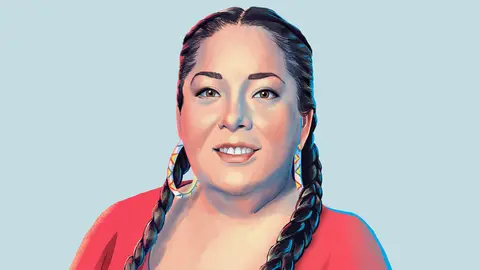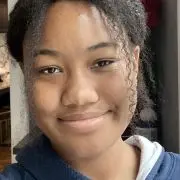
This letter features reporting from “COVID-19 Data on Native Americans Is ‘a National Disgrace.’ This Scientist Is Fighting To Be Counted” by Lizzie Wade
Dear Congresswoman Mikie Sherill,
The United States government has shown grand ineptitude in response to the COVID-19 virus outbreak. Its inability to enforce rules and policies that would slow the spread of the virus has impacted the lives of millions and has ended the lives of hundreds of thousands. The irresponsibility of the government has affected no one more than predominantly marginalized communities, and specifically Indigenous communities. According to the Pulitzer Center article “COVID-19 Data on Native Americans Is 'a National Disgrace.' This Scientist Is Fighting To Be Counted” by Lizzie Wade, Native American and Alaskan Native individuals are 3.5 times more likely to contract the coronavirus than non-Hispanic white individuals. After observing such data, the question “Why is this happening?” arises. The reason is found both historically and systemically in this country. On the historical front, Wade’s article describes how the displacement of Indigenous communities from their native land contributes. The diaspora of Indigenous communities into reservations required Native people to abandon many of their traditional customs. Native people were forced to adapt to a foreign land and new resources. This resulted in the abandonment of many dietary, lifestyle, and medical practices that sustained Indigenous communities for generations. The effects are exceedingly clear. “Today, American Indians and Alaska Natives have higher rates of obesity, diabetes, asthma, and heart disease than white Americans, as well as higher rates of suicide," as stated by Wade. If we know this is happening, why is nothing being done? The answer this time is systemically rooted within our government. For years, Indigenous communities have not been provided adequate government data—data that is needed to help said communities function. This is a trend that is still being followed in modern times. Wade states, “The U.S. census, which began in 1790, excluded all American Indians until 1860, and didn’t count those living on reservations until 1900.” This data was later weaponized by the United States government, which used incorrect data to invade “empty” Indigenous land without punishment. This all goes without mentioning how the data collected in regards to Indigenous communities often involves racial bias and racial misclassification. This time, inadequate data is harming Indigenous communities during the pandemic. Wade quotes social demographer at the University of California and citizen of the Northern Cheyenne Nation, Desi Rodriguez-Lonebear, who states, "Citing privacy concerns, for example, CDC initially denied tribal epidemiology centers, including UIHI, access to data about testing and confirmed COVID-19 cases, even though it was making those data available to states. What’s more, data collected by tribes, local and state health departments, and national agencies are often wildly inconsistent." Without having sufficient testing, data, and government support when it comes to healthcare, it comes as no surprise that Indigenous communities are struggling with the virus. This is not okay, especially during a time like this. Indigenous communities do not deserve to be subjected to the racist, systemic, and historical biases that have been placed upon them.
Injustice against Indigenous communities is an issue that has often been ignored in America. These issues are often suppressed and hidden, just like most other issues regarding marginalized communities, and often go unnoticed. Do you know how many federally recognized Native American nations are still existing in the United States today? According to the National Congress of American Indians, 574. Do you know how many of those Nations are located in Alaska? 299. I am sure you learned a lot about what happened after Columbus arrived in America, but do you know much about what happened before? Is Native history being taught in school? I do not think so. We live in a country that for years believed Christopher Columbus “discovered” America—a man who raped, killed, stole from, and terrorized the Indigenous people who already lived here—he even got a holiday. This country was built on the backs of Indigenous communities and we don’t even have the decency to recognize the culture. Due to the pandemic, the racial injustices that marginalized communities face daily are being exposed to the world. The pandemic has forced everyone to stop and observe. It has forced people to see what is wrong with the world. It has forced people to show their character. And most importantly, it has forced people to acknowledge their biases. This pandemic has forced me to take a moment and observe the world I live in as well. Personally, I have been forced to recognize the racism that affects me every day. I have been forced to view the world outside the boundaries of my bubble. Now that I have left my bubble, I am never going back. The treatment of Indigenous communities during the pandemic is currently being regarded as just another thing by the American government, and I refuse to stand by and let that happen. I refuse to sit back and allow other human beings to get torn down by blatant racism and ignorance. And I strongly encourage you to do the same.
By now I can only hope that you have heard what I’ve had to say. I can only hope you are going to take this information and fight for change. Now is the time for the mistakes of our ancestors to be corrected. We cannot go forward until everyone is treated with decency and respect. I know I am going to keep fighting for change. It might take my whole life, but it’ll be worth it in the end. Hopefully, my writing has provided you insight on the issue and you want to make a change. I now ask you to bring attention to this issue. I urge you to bring awareness to your fellow congresspeople on this issue. The more people who are aware that this is happening, the more conversation about this issue will arise. Too often have issues regarding Indigenous communities gone unmentioned and unnoticed. We need adequate data being gathered and provided to Indigenous communities. The more accurate the data, the more accurate the amount of testing being provided to the communities, and the fewer people contracting the virus. We need action now more than ever. We cannot stand by and let Native Americans suffer, especially not during a time like this.
Sincerely,
Sophia Reynolds

Sophia Reynolds is a 9th grader who is currently attending Montclair High School in Montclair, NJ. She has passion for music, activism, reading, the visual and performing arts, and is on the crew team. She currently lives with her mom and dad, two siblings, and two dogs. Being a STEM student and having a love for science, Sophia aspires to study aerospace engineering. She would love to attend her dream school, Princeton University.
Read more winning entries from the 2020 Local Letters for Global Change contest!